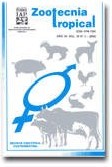
|
Zootecnia Tropical
Instituto Nacional de Investigaciones Agrícolas Venezuela
ISSN: 0798-7269
Vol. 28, No. 4, 2010, pp. 467-475
|
 Bioline Code: zt10046
Bioline Code: zt10046
Full paper language: English
Document type: Research Article
Document available free of charge
|
|
|
Zootecnia Tropical, Vol. 28, No. 4, 2010, pp. 467-475
| en |
Physicochemical and microbiological of Carora goat white cheese in Lara state, Venezuela
Duran, Luis; Sánchez, Cecilia; Palmero, Johny; Chaparro, Luis; Garcia, Tonny & Sánchez, Edward
Abstract
The quality and sensory attributes of cheese vary as a result of lack of standardization of manufacturing processes
and the composition of the raw material. The physico-chemical composition (moisture, protein, fat, chlorides, ash,
pH, water activity-aw) and the microbiological quality (total and fecal coliforms, Escherichia coli

, Staphylococcus
aureus

, Salmonella

sp) of cheese were studied from four traditional goats production units at the surroundings
of Carora, Lara state The results showed high variability in their physicochemical and microbiological quality
composition: moisture (50,24 - 55,03 g/100g), protein (18,06 - 31,07 g/100g), fat (23,55 - 35,31 g/100g), chloride
(3,74 - 6,79 g/100g), ash (4,86 - 8,46 g/100g), acidity (0,19 - 0,28% lactic acid), a w (0, 95 - 0,98), total coliforms
(10 2 - 10 4 MPN/ g) and fecal (10 1 - 10 4 MPN/g). We determined the presence of E. coli, and Citrobacter
freundii

, and no more of S. aureus and Salmonella spp. Based on the results obtained, it may indicate that the
cheeses of this place had lack of microbiological quality and in some cases may represent a risk to consumer
health. It is necessary to apply good manufacturing practices (GMP) and HACCP to improve the sanitary quality
of artisanal cheeses.
Keywords
cheese; coliforms; goats
|
| |
| es |
Caracterización fisicoquimica y microbiológica de quesos de cabra en Carora, estado Lara, Venezuela
Duran, Luis; Sánchez, Cecilia; Palmero, Johny; Chaparro, Luis; Garcia, Tonny & Sánchez, Edward
Resumen
La calidad y los atributos sensoriales de los quesos artesanales varían como consecuencia de la falta de
estandardización de los procesos de fabricación y de la composición de la materia prima. La composición
fisicoquímica (humedad, proteínas, grasas, cloruros, cenizas, pH, actividad de agua-a w) y la calidad microbiológica
(coliformes totales y fecales, Escherichia coli

, Staphylococcus aureus

, Salmonella

) se estudió en quesos
provenientes de cuatro unidades de producción caprina tradicionales a las afueras de Carora, estado Lara. Los
resultados muestran una gran variabilidad en su composición fisicoquímica y calidad microbiológica: humedad
(50,24 – 55,03g/100g), proteínas (18,06 – 31,07g/100g), grasa (23,55 – 35,31 g/100g), cloruros (3,74 – 6,79
g/100g), cenizas (4,86 – 8,46g/100g), acidez titulable (0,19 – 0,28% ácido láctico), a w (0,95 – 0,98), coliformes
totales (10 2 – 10 4 NMP/g) y fecales (10 1 – 10 4 NMP/g). Se determinó la presencia de E. Coli, y de Citrobacter
freundii

, más no así de S. aureus ni de Salmonella spp. Con base a los resultados obtenidos, se puede indicar que
la calidad microbiológica de los quesos de esta localidad es deficiente y en algunos casos pueden representar un
riesgo a la salud de los consumidores.
Palabras-clave
queso; coliformes; cabra
|
| |
© Copyright 2010- Zootecnia Tropical
Alternative site location: http://www.sian.inia.gob.ve/repositorio/revistas_ci/ZootecniaTropical/ztindice.htm
|
|
